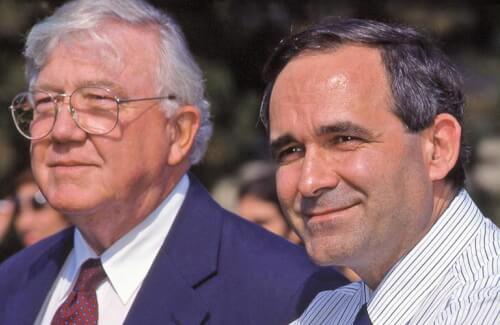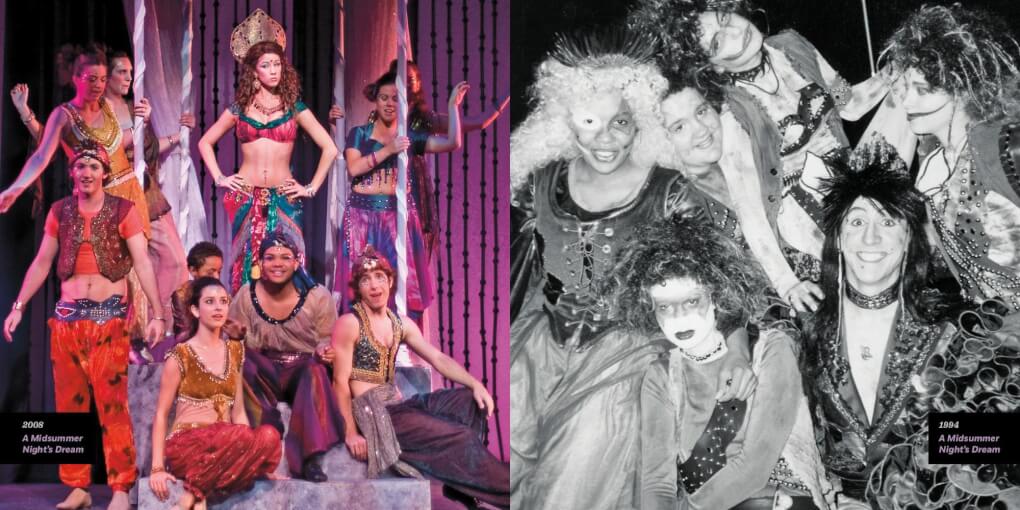The Grand Valley Shakespeare Festival is the oldest and largest festival in Michigan celebrating the Bard’s life and works. Every year, festival events attract thousands of people of all ages to Grand Valley’s campuses and to West Michigan to enjoy the legacy of Shakespeare.
The Grand Valley community will honor the “silver coronation” of the festival with a series of events beginning in September.
'TO BE OR NOT TO BE: THAT IS THE QUESTION'
In 1992, President Emeritus Arend D. Lubbers visited a Shakespeare Festival at the University of Colorado. Following that positive experience, he decided that adding more of a Shakespearean presence to Grand Valley would be beneficial to faculty, students, and the broader community.
Lubbers turned to Ivo Soljan, professor of English and notable Shakespeare scholar, in 1993 to create the “Shakespeare Society.”
“My original idea was that we should have a forum dedicated and devoted to Shakespeare’s work here at Grand Valley,” said Soljan. “Our first activity was to open the Shakespeare Garden on campus with the help and planning of Roz Mayberry, former liberal studies program coordinator and assistant professor of English.”

Following a series of successful events in the fall of 1993, Soljan teamed with Roger Ellis, professor of theater, and Laura Salazar, professor emerita of theater, to expand the society into the Grand Valley Shakespeare Festival in 1994.
The goal of the festival was to involve the entire campus community by adding a mainstage production, high school matinees, lecture by a guest scholar and the involvement of guest artists and Grand Valley alumni from around the world.
Over the years, the festival has added a Greenshow, a student competition, Shakespeare-based scholarships, a biennial Shakespeare conference featuring a Resident Shakespeare Scholar, and performances by Bard to Go, Grand Valley’s all-student touring Shakespeare company.

“Participating in the festival means the regular opportunity to enter the laboratory of live theater performance to experience the world’s greatest storyteller and humanity’s greatest spokesman in the arena where he is best understood,” said Jim Bell, Shakespeare Festival managing director. “Times change, but thoughts about life still often involve those areas of life that Shakespeare’s plays and characters contemplate, confront and challenge.”
Ellis said that he feels the greatest value of Grand Valley’s Shakespeare Festival is its broad appeal across campus.
“Over the decades it has brought together students and faculty from many academic disciplines; and has tapped the interest and support of many individuals and institutions in the local community,” said Ellis. “This means that Shakespeare is definitely not a museum-piece, but a highly relevant and exciting artist whom many turn to even now in our digital age, and amidst the many troubling social issues we confront in our global era.”
Lubbers recalled that he believed the Shakespeare Festival would become one of Grand Valley’s most distinguished programs. And, he was right.
“On its 25th anniversary, its founders and perpetuators can make that claim,” said Lubbers. “Students, faculty, audiences and participants from inside and outside the university by the hundreds, even thousands, have felt the impact of Shakespeare’s singular talent. We all like success stories and this is one of our own, and we can feel justified pride.”

Bard beyond borders
While the Shakespeare Festival’s presence is certainly felt on campus, the impact of the event extends beyond West Michigan.
More than 30,000 middle and high school students have visited Grand Valley to enjoy the mainstage production since the festival’s inception. This year’s play will be “King Lear” — a tale of a retiring king who determines through a series of tests of love how to divide his kingdom among his three daughters.
This will be the first time Grand Valley students perform “King Lear” for the festival; the play was chosen through a poll given to mainstage audiences three years ago.
For schools lacking the means to send their students to watch the annual production, Shakespeare Festival faculty and students provide a solution: Bard to Go.
Bard to Go travels to numerous West Michigan area schools to perform 50-minute plays to accommodate the length of class periods. The group additionally offers at least one public performance each year.

Every show, which is generally composed of a montage of Shakespeare’s plays, is written by Grand Valley faculty and performed by only six actors, a concept known as “Short Shakespeare.”
Karen Libman, professor of theater and Bard to Go co-founder, said that knowledge of the works of Shakespeare is a necessity for any education to be considered complete.
“The extraordinary writing skills with which Shakespeare created his accurate portrayals of human truth have not been replicated since his death nearly 400 years ago,” said Libman. “Everyone, regardless of age, context or background, deserves to experience the relevance of Shakespeare and the classics in their lives.”
Bard to Go’s 2018 production will be a condensed version of “Twelfth Night,” which Libman called one of Shakespeare’s most popular comedies.
Traveling and performing internationally is also a recurring experience for Bard to Go students. The troupe’s first trip was in 2005 to Jamaica and since then, students have performed in Italy, China, Canada, the Bahamas and the Czech Republic.
This year, an international Shakespearian presence will travel to the Allendale Campus instead of Grand Valley students venturing out around the world.
The “Bard Beyond Borders: An International Shakespearience” series will feature performances by Shakespeare companies from around the world, including ensembles from Bangladesh and the Bahamas.
Will Power
Elementary-aged children also have the opportunity to gain exposure to Shakespeare through the Will Power Summer Camp for Kids. The camp, in conjunction with the Shakespeare Festival, focuses on developing creativity and expanding campers’ imaginations through the process of drama.
Using the works of Shakespeare, campers learn about theater concepts and storytelling through activities such as games, stage combat and improvisation centered on the Bard’s plays.
Libman developed the camp in 2012 after visiting other Shakespeare festivals to conduct interviews and observe educational programs during a sabbatical. Since Grand Valley did not have a Shakespeare program for young children at the time, she worked to change that.
“I thought that we could serve the community and also serve our Grand Valley students and help them with their education and their careers by giving them the opportunity to be counselors and administrative assistants as part of this program,” said Libman. “Shakespeare appeals to everyone and age is not a factor that keeps folks from understanding his work. There is nothing like seeing a 7-year-old talk about how ‘Hamlet’ is her favorite play.”

Defy the stars
Grand Valley faculty strive to remain connected to the hundreds of alumni who have previously participated in Shakespeare Festival events.
In fact, many alumni have returned to campus as performers, directors, stage managers, designers and technicians to contribute to the festival’s activities and performances.
For the festival’s 25th anniversary, Scott Watson, ’09, has been commissioned to write an original play called “Defy the Stars.”
Inspired by true events, the play centers around Ryfka Horn, a famous German-Jewish actress, who is trapped in the Westerbork Transit camp in July 1942. Because a full train of prisoners is sent from Westerbork to Auschwitz every week, Horn convinces the commander of the camp to stage a production of “Romeo and Juliet” in order to avoid deportation for herself and her cast.

While at Grand Valley, Watson was heavily involved in the Shakespeare Festival, having performed in productions of “Hamlet,” “A Midsummer Night’s Dream,” and “Cymbeline.” He also toured with Bard to Go for a time and served as the festival’s student liaison in 2008.
Currently acting in the long-running off-Broadway show “Drunk Shakespeare” in New York City, Watson said that his time at Grand Valley set the stage for his professional career.
“Shakespeare’s works are produced by professional theaters around the world and having a particular focus in Shakespeare, as well as a solid academic and practical knowledge of how to delve into his plays and characters, gave me a huge advantage as a professional actor,” Watson explained. “GVSU gave me so many opportunities to be on stage and in rehearsals where I was given the creative freedom to make bold choices, to fail, to learn from my mistakes, and grow as a performer.”
Watson said that he felt honored when asked by Grand Valley faculty to write something specifically for the festival.
“It’s been a wonderful driving force to create something special,” said Watson. “Theater is always magic and writing the play is always the beginning, so I can’t wait to learn more about the play through the talents of the actors, producers and creative team that will help bring it to life.”
— Nancy Bell contributed to this article







